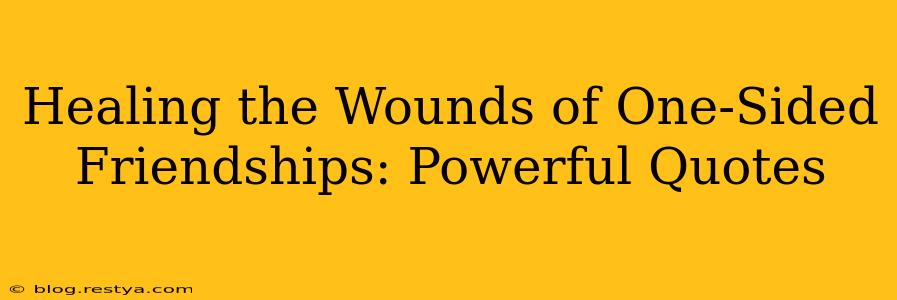One-sided friendships. That sinking feeling in your gut when you realize you're pouring your heart out while receiving little in return. It's a painful experience, leaving you feeling drained, undervalued, and questioning your self-worth. But you're not alone. Many of us have navigated the treacherous waters of unequal friendships, and healing from them is possible. This journey involves recognizing the imbalance, setting healthy boundaries, and ultimately, finding friends who value you for who you are.
This isn't about assigning blame or dwelling on the past; it's about reclaiming your emotional well-being. We'll explore powerful quotes that offer solace and wisdom, and importantly, guide you on your path to healthier, more reciprocal relationships.
Recognizing the Signs: Is Your Friendship One-Sided?
Before we dive into healing, let's acknowledge the signs of an unbalanced friendship. Do you find yourself:
- Constantly initiating contact? Are you the one always texting, calling, or suggesting plans?
- Feeling unheard or dismissed? Do your feelings and needs seem to be overlooked?
- Giving more than you receive? Do you consistently offer support, time, and emotional energy without similar reciprocation?
- Feeling drained after interacting? Instead of feeling energized and happy, do you feel emotionally exhausted?
- Questioning your self-worth? Does the imbalance make you doubt your value as a friend?
If you answered "yes" to several of these questions, it's crucial to address the situation. Ignoring these warning signs can prolong the pain and impact your overall well-being.
Powerful Quotes to Guide Your Healing Journey
Words can be incredibly powerful during challenging times. Here are some quotes that can provide comfort and guidance:
- "The best mirror is an old friend." - George Herbert: This quote reminds us that true friends reflect our authentic selves, not just the parts we present to others. A one-sided friendship often lacks this genuine reflection.
- "It is better to be alone than to be with those who make you feel alone." - Marilyn Monroe: This resonates deeply with the experience of a one-sided friendship. You may be surrounded by someone, but still feel profoundly alone.
- "Friendship is a single soul dwelling in two bodies." - Aristotle: This definition highlights the mutual respect, understanding, and shared experiences that are crucial for a healthy friendship. One-sided relationships lack this essential unity.
Setting Healthy Boundaries: Reclaiming Your Time and Energy
Setting boundaries is a crucial step in healing from a one-sided friendship. This doesn't mean ending the friendship abruptly, but it does mean prioritizing your emotional well-being. Here's how:
- Reduce contact gradually: Instead of cutting ties instantly, try reducing the frequency and duration of your interactions.
- Prioritize your own needs: Make sure your own emotional well-being is not compromised.
- Communicate your feelings (if appropriate): If you feel comfortable, you can express your feelings honestly and openly to your friend. This might lead to positive change, or it may help you accept the reality of the situation.
- Focus on self-care: Engage in activities that bring you joy and help you recharge your energy levels.
Moving Forward: Finding Reciprocal Friendships
Healing from a one-sided friendship takes time, but it’s an opportunity for growth. Focus on cultivating new friendships where you feel seen, heard, and valued. Join groups or activities aligned with your interests, and be open to connecting with like-minded people. Remember, genuine connections are built on mutual respect and reciprocity.
Frequently Asked Questions
How do I know if a friendship is truly one-sided?
Pay close attention to the balance of give and take. Are you consistently the one initiating contact, offering support, and listening, while receiving little in return? Do you feel drained after interacting? These are strong indicators of an unequal dynamic.
Should I confront my friend about the imbalance?
This depends entirely on your comfort level and the nature of your friendship. A direct conversation could lead to positive change, or it could confirm that the imbalance is an unfixable aspect of the relationship. Consider whether the friendship is worth the risk of potential conflict.
What if ending the friendship feels too difficult?
Gradually reducing contact can be a gentler approach. This allows you to distance yourself emotionally while avoiding a potentially painful confrontation. Focus on prioritizing your emotional well-being above all else.
How long does it take to heal from a one-sided friendship?
Healing takes time and varies from person to person. Be patient with yourself, and allow yourself to grieve the loss of what you thought the friendship was. Focus on self-care and building new, healthy relationships.
Healing from a one-sided friendship isn’t about blaming or holding onto anger; it’s about recognizing your worth and prioritizing your emotional health. By understanding the signs, setting boundaries, and surrounding yourself with supportive friends, you can move forward and create relationships that nourish your soul. Remember, you deserve to be in friendships where you feel valued and respected, and that's exactly what you should strive for.

